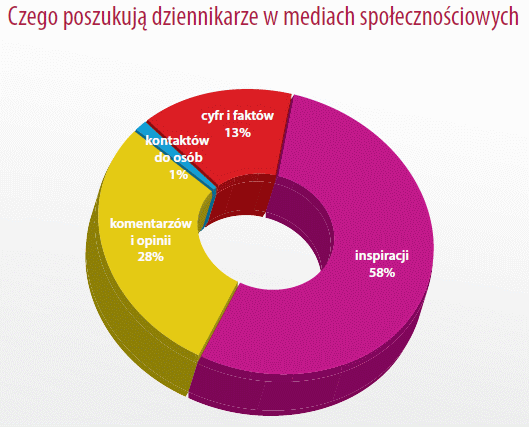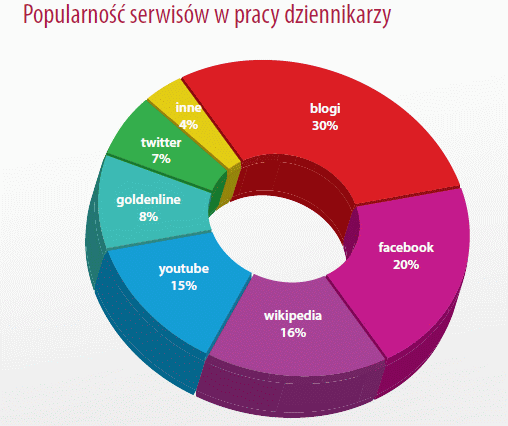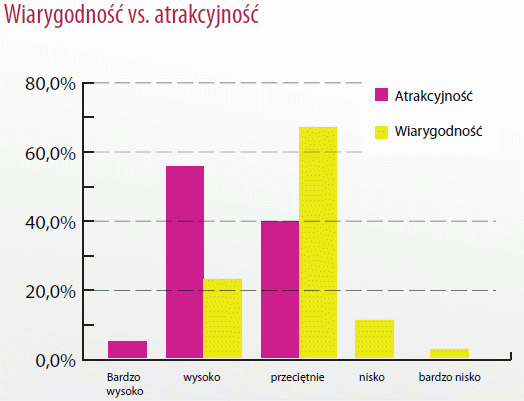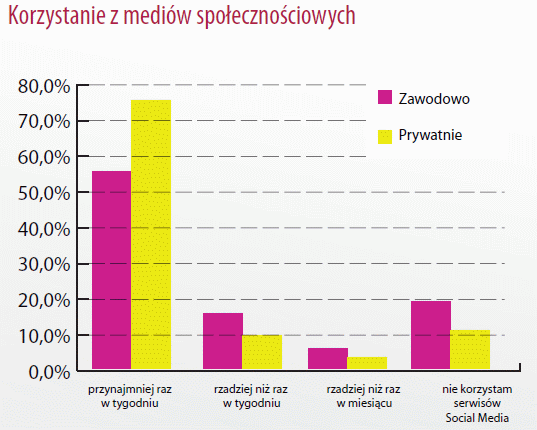 Multi Communications, Journalists and Social Media 2011
Multi Communications, Journalists and Social Media 2011Journalists most often visit blogs, which are also considered the most reliable sources of knowledge and information among all social media platforms. Facebook ranks second in both popularity and credibility, with Wikipedia following in third place. This pattern shows that the ranking for credibility aligns with the popularity ranking.
 Multi Communications, Journalists and Social Media 2011
Multi Communications, Journalists and Social Media 2011The Multi Communications study reveals that information found by journalists on social media is considered more attractive than credible. A quarter of respondents rated the credibility of such information as high, but none rated it very high. On the other hand, no one rated the attractiveness of social media content as low or very low. Around 60% of respondents rated the credibility of these sources as high or very high.
 Multi Communications, Journalists and Social Media 2011
Multi Communications, Journalists and Social Media 2011Polish journalists admit to frequently using social media platforms. Nearly two-thirds use them regularly for work, while even more use them for personal purposes, with about three-quarters of media workers indicating personal use.
 Multi Communications, Journalists and Social Media 2011
Multi Communications, Journalists and Social Media 2011The survey was conducted independently by Multi Communications in November 2011. Over 110 journalists from various media types (e.g., press, internet, TV) and covering different topics (business, new technologies, lifestyle) participated in the study.
COMMERCIAL BREAK
New articles in section Media industry
Tags, hashtags and links in video descriptions. Youtube SEO after Gemini AI update [ANALYSIS]
BARD
Once, positioning a video on Youtube was simple. It was enough to stuff the description with keywords and wait for results. Those days are not coming back. In 2026, the algorithm is no longer a simple search engine that connects dots. It is the powerful Gemini AI artificial intelligence that understands your video better than you do.
Freelancers 2025 in media and advertising. Useme report
Krzysztof Fiedorek
The modern media and communication market presents entirely new challenges for independent creators. Traditional services are giving way to more complex forms of messaging. The most popular industries in which Polish freelancers operate focus on companies' online presence and visual content.
Video content in Poland. What and how we watch
Paweł Sobczak
Video content is watched remotely, but streaming services are mainly enjoyed in the comfort of home. This is how the consumption of audiovisual content by Poles in 2025 can be summarized. This is the result of an analysis of a study conducted by SW Research and data from the company MEGOGO.
See articles on a similar topic:
The Podcast Market in Poland. Research by Wprost and Tandem Media
Krzysztof Fiedorek
How many Polish internet users listen to podcasts? Where and how do we listen? How and why do we choose episodes? Two major studies on this topic were recently released. One by Wprost, the other by Tandem Media from Agora Radio Group. We present both for data comparison and insights.
Virtual Influencers Perceived as More Authentic than Real Ones
Agnieszka Kliks-Pudlik
Virtual influencers are fictional, generated characters that imitate the appearance and behaviour of real people. They have millions of followers. They are perceived by Gen-Alpha as even more authentic than real people, which creates many challenges, says Dr. Ada Florentyna Pawlak.
Energy under attack. Disinformation threatens Poland’s power transition
KFi
One in five online messages about energy may be fake. Between 2022 and 2025 nearly 70,000 publications warning and condemning disinformation in this strategic sector were recorded in Polish media. They generated a reach of 1.19 billion impressions.
Artificial intelligence in newsrooms. Three realities of the AI era in media
Krzysztof Fiedorek
According to a report by the European Broadcasting Union, many newsrooms already use AI but still do not fully trust it. Audiences do not want "robotic" news, and the technologies themselves though fast can be costly, unreliable, and surprisingly human in their mistakes.





























